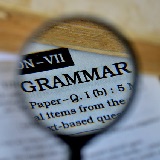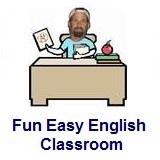|
|
| |
|
|
| |
|
|
| Fun Easy English Classroom May 29 |
|
| |
Classroom
Today
Learn about
simple past |
|
 Simple
Past Simple
Past
Today in the Fun Easy English classroom you are going to learn about
simple past an important part of English
grammar. |
 Hey
if you cannot understand something on this page, Hey
if you cannot understand something on this page,
then use the Fun Easy English
dictionary
(opens in a new window) |
|
|
|
 Grammar:
Simple Past Grammar:
Simple Past
Definition of
simple past. |
- Simple past: "I went." In English this implies that the
action took place in the past and that it is not taking place
now.
|
| tense &
aspect |
aspect |
|
simple |
perfect |
progressive |
perfect progressive |
|
tense |
past |
simple
past |
past
perfect |
past
progressive |
past
perfect
progressive |
|
present |
simple
present |
present
perfect |
present
progressive |
present
perfect
progressive |
|
future |
simple
future |
future
perfect |
future
progressive |
future
perfect
progressive |
|
|
Simple Past Examples |
- Simple past:
- I painted the house.
- I ate breakfast this morning.
- I went to the bookstore with my best friend.
|
|
Fun Easy English Grammar Lessons |
|
 From
YOUR Teacher: Simple
Past From
YOUR Teacher: Simple
Past
Notice in the examples above the action in each sentence
took place in the past has been completed. |
|
|
|
|
|
Additional Lessons |
 About These
Lessons About These
Lessons
The following classroom lessons are great for students
who want additional conversation, listening, and reading
practice. |
-
Conversation Lesson -
Advanced
Level. Dialogs for everyday use.
Short situational dialogs for students of English as
a Foreign (EFL) or Second (ESL) Language with a
written conversation and a conversation notes
section.
|
 Conversation Lesson
1 - Formal Greetings Conversation Lesson
1 - Formal Greetings
(Advanced -
Conversation, Reading)
Dialogs for everyday use. Short situational dialogs for
students of English as a Foreign (EFL) or Second (ESL)
Language. |
Formal Greetings
JAMES: Good morning, Professor Austin, how
are you doing?
PROFESSOR AUSTIN: Good morning, James. I
am doing well. And you?
JAMES: I’m great, thank you. This is my
friend Emma. She is thinking about applying to this college. She has a few
questions. Would you mind telling us about the process, please?
PROFESSOR AUSTIN: Hello, Emma! It’s a
pleasure to meet you. I’m more than happy to speak with you. Please stop by my
office next week.
EMMA: It’s a pleasure to meet you,
professor. Thank you so much for helping us.
PROFESSOR AUSTIN: Don’t mention it.
Hopefully, I will be able to answer your questions! |
|
Conversation Notes |
- The greetings good morning/good afternoon/good evening
are used at different times of the day to greet people. “Good evening” is
often used after 6 p.m. or generally when the sun has set.
- “Good night” is not a greeting: It is used when leaving
a place or group of people. Thank you and good night!/Good night, and see
you tomorrow.
- When people meet in the United States, it is customary
for them to shake hands. A handshake should be firm and usually lasts for
about two to three seconds — which allows enough time to say “Nice to meet
you.”
- “Don’t mention it” is another way of saying “You’re
welcome.” The phrase “You are welcome” is more formal. However, responses
such as Don’t mention it./No problem./ Happy to help. are informal ways of
replying to a thank you.
|
|
Source: U.S. State Department |
|
Additional Conversation |
 Conversation Conversation
This is a collection of 30 situational conversations
which focus on a wide variety of communicative and
natural encounters in English....these
lessons are for beginning students. |
 Conversation Conversation
This is a collection of 36 situational conversations
which focus on spoken American English in a relatively
natural way....these
lessons are for intermediate students. |
 Conversation Conversation
English conversation lessons. 52
lessons covering pronunciation, speaking,
writing, and grammar topics....these
lessons are for beginning students. |
 Conversation Conversation
English conversation lessons. 30
lessons focusing mostly on communication and
grammar topics....these
lessons are for intermediate students. |
|
|
|
|
|
|
|
 Hey Students, Hey Students,
Use this dictionary and reference to look up any words you do not
understand in Fun Easy English.
Note: search opens in a new tab. |
|
|
|
|
|
Search Fun Easy English |
|
|
|
|
|
|
|
|
|
|
|
|
|
|
|
About
Contact
Copyright
Resources
Site Map |